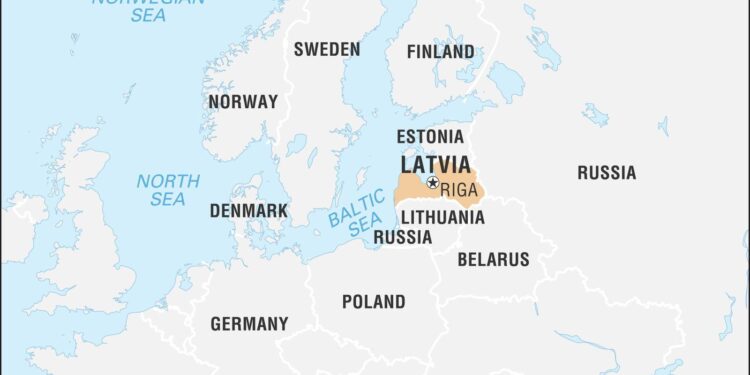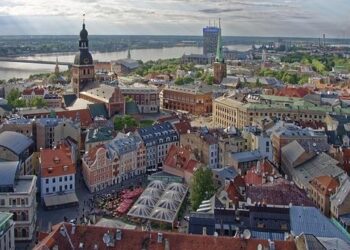European Commission President Ursula von der Leyen’s recent visit to Latvia underscored the European Union’s steadfast commitment to solidarity amid ongoing regional challenges. During her trip, von der Leyen emphasized the importance of maintaining stringent sanctions while also announcing new funding initiatives aimed at bolstering the EU’s border regions. The visit highlights Brussels’ strategic focus on supporting member states on the frontlines of geopolitical tensions, reinforcing unity and resilience in the Baltic region.
Von der Leyen Reaffirms EU Solidarity with Latvia Amid Regional Security Challenges
European Commission President Ursula von der Leyen’s recent visit to Latvia underlined the European Union’s unwavering commitment to the security and prosperity of its eastern border. Amid escalating regional tensions, she emphasized the EU’s support through enhanced cooperation and reinforced sanctions against destabilizing forces. Her meetings with Latvian officials also focused on bolstering regional resilience by funding critical infrastructure projects designed to strengthen border security and improve cross-border mobility.
Key components of the EU’s renewed support package include:
- Increased financial aid for border security enhancements, including surveillance technology and rapid response capabilities
- Expanded sanctions regime targeting entities undermining regional peace
- Strategic investment in local economies to mitigate socio-economic vulnerabilities along the border
| Funding Area | Amount (‚ā¨ million) | Purpose |
|---|---|---|
| Border Infrastructure | 120 | Surveillance & Patrol Equipment |
| Economic Reinforcement | 80 | Support for SMEs & Local Services |
| Sanctions Enforcement | 50 | Compliance & Monitoring |
EU Strengthens Sanctions to Counter Ongoing Threats in Eastern Europe
In a decisive move to address the escalating geopolitical tensions, the European Union has expanded its restrictive measures targeting key economic sectors and individuals aligned with destabilizing actions in Eastern Europe. These enhanced sanctions are designed not only to exert maximum pressure on the entities responsible but also to signal unwavering support for the sovereignty and security of the affected nations. The EU’s strategy now includes tougher financial restrictions, tighter export controls, and a broadened blacklist that covers new entities linked to ongoing disruptions, aiming to curtail their operational capabilities.
The latest sanctions package also allocates significant new funding aimed at strengthening border infrastructure and resilience in vulnerable regions. This approach combines economic penalties with proactive investment to safeguard EU member states adjacent to the conflict zones. Key features of the new funding include:
- Enhanced surveillance technology at critical border points
- Support programs for local crisis response teams
- Infrastructure upgrades to improve rapid deployment capabilities
| Measure | Budget Allocation | Target Region |
|---|---|---|
| Border Surveillance Systems | ‚ā¨120 million | Latvia, Estonia |
| Crisis Response Training | ‚ā¨45 million | Lithuania, Poland |
| Infrastructure Enhancement | ‚ā¨80 million | All Baltic States |
New Funding Initiatives Aim to Boost Development and Resilience in Baltic Border Communities
The European Commission has unveiled a series of targeted funding schemes designed to strengthen the infrastructure, economic vitality, and cross-border cooperation in Baltic communities adjacent to EU external borders. These initiatives aim to address longstanding challenges such as limited connectivity, workforce shortages, and vulnerability to external economic shocks. Allocation of resources will prioritize sustainable development projects, including renewable energy integration, digitalization efforts, and enhanced transportation links to better connect isolated areas with national and European markets.
Key components of the new funding framework include:
- Grants for small and medium enterprises (SMEs) to foster innovation and entrepreneurship within border regions
- Support for cross-border social programs aimed at building community resilience and cultural exchange
- Investment in security and emergency response systems to bolster preparedness amid geopolitical uncertainties
As these efforts gain momentum, local authorities anticipate a significant uplift in economic diversification and social cohesion, setting a robust foundation for future growth and stability in the Baltic border zones.
To Conclude
Von der Leyen’s visit to Latvia underscores the European Union’s commitment to reinforcing solidarity with its eastern neighbors amid ongoing regional challenges. With fresh sanctions aimed at addressing security concerns and the announcement of new funding for border regions, the EU signals a strengthened partnership and a proactive approach to stability and development in the Baltics. As Latvia continues to navigate geopolitical pressures, this visit marks a pivotal moment in deepening cooperation and resilience within the Union’s frontier states.
















